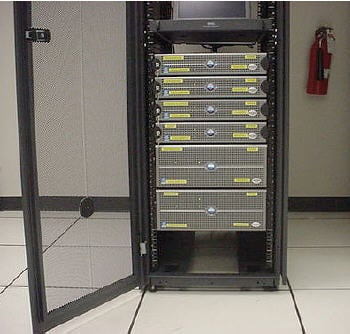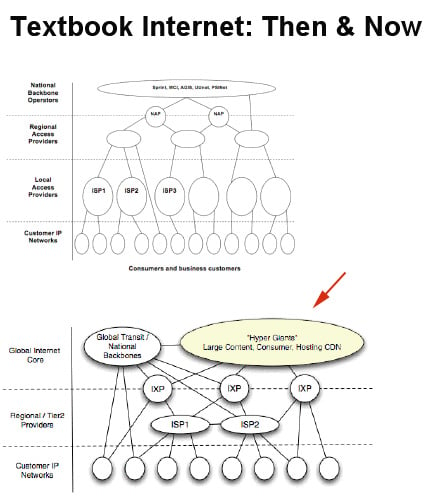Original URL: https://www.theregister.com/2010/08/09/neutrality_new_net_hypergiants/
How neutrality locks in the web's 'Hyper Giants'
What Google-Verizon means for you
Posted in Networks, 9th August 2010 15:36 GMT
Analysis The creatures outside looked from pig to man, and from man to pig, and from pig to man again; but already it was impossible to say which was which. - Animal Farm
By the mid 1990s it had become pointless to compete with Microsoft in operating systems and office software - and investment in potential competitors dried up. The best you could hope for as a software company was to carve out a niche as part of the Windows Office system; this was a very small niche indeed.
The same thing is happening today with web services. But what Google and other web giants are doing goes largely unnoticed, even by analysts, pundits and Presidential advisors. What they are able to do is use their scale, and clever and cynical politics to obscure how they're solidifying their competitive advantage. In particular, they're swearing allegiance to (and lobbying for) an idea which doesn't apply to their operations, but which will keep smaller competitors out of the market. A Zoho, for example - or the next new YouTube.
To understand this, you have to keep in mind that there isn't really such a thing as 'The Internet', which may sound strange. It might be even stranger to consider that the internet was never designed as a masterplan to be 'The Internet', thankfully, as it turned out.
Instead of one network, picture lots of private networks. The internetworking protocols (the clue's in the name) provide guidelines for some lowest common denominators by which these private networks can cooperate.
The good thing is that the architects' more modest ambition of "internetworking" succeeded where many grand plans had failed. It explains why the internet is so resilient, and why it's so hard to regulate, or control. The downside is that it's hard to improve upon today's internet, either, since innovation chugs along at the pace of the slowest significant network.
But one way around the bottlenecks is permissible. Deliverers of content and services can climb off the public internet, and do deals directly with the customer-facing networks to which you or I subscribe. Instead of making a journey of two dozen hops around the world, the material need only take two or three.
This is what Google, Amazon and others do. They operate private internets of their own, and peer with the largest ISPs.
Three things are required. One is a peering arrangement with the largest ISPs, typically achieved by hooking into a private peering facility. The other is to help out the ISPs by installing caching servers at the edge of the network.
Here is a list of Google's private peering arrangements, and here is what one of Google's caching servers looks like:

A Google caching server.
And the third thing is a large wallet, because private peering arrangements are only available to the very rich. Even if no cash changes hands, private peering is a club open only to those who generate huge quantities of traffic. Running your own fibre network is also expensive - but not as expensive as sending your bits over the public internets, and trusting the lowest common denominator.
If you're a startup, you won't be able to afford it. You will be obliged either to use an intermediary content network such as Limelight or Akamai, which puts you at a cost disadvantage; or stay in the slow lane, which puts you at a serious, possibly terminal, performance disadvantage.
So that's the infrastructure. Where does the politics fit in?
The clever thing about 'Net Neutrality', the idea that means so many different things to different people, is that whatever regulations may (or may not) be written - they don't really apply to the Googles. If Verizon and Google are formally cosying up, as reports suggest, it's merely formalising the arrangements they already have. Google and the other web giants can be confident that the 'Neutrality' regulation only apply to non-members, using the public internet.
Google and Amazon have been able to take advantage of ignorance and naivety. How could this be?
Some nets are more neutral than others
Because Google isn't a telco, or isn't Microsoft, people assume it must be a White Knight, and therefore doing everything for all the best possible reasons. But Google isn't obliged to do charity, or perform utopian deeds - it just does what's best for Google. And sometimes what's best for Google is making sure the next Google doesn't get any favours. That's naivety.
Then there's the ignorance. I've often wondered how technology utopians seem to have a 'birthing' moment, much as enthusiasts for LSD or MDMA do too. Their mental model of the world is frozen in time, at the moment they first discovered the wonders of the drug net, so how the world looked in 1994, or in 2002, then must be the one true explanation; the ever-shifting politics and power plays of the present must be buried under a unifying nostalgic memory, or sweeping generalisation. You will this true for any Berkman Center alumini, or any Web 2.0 evangelist.
Well, things change. It's no longer accurate to think of a hierarchical network core. And things are changing fast. Google wasn't even in the top 20 originators of traffic in 2007, but last year it was third - Google's private network grew annually from 3.4 per cent of traffic, to six per cent, to around 10 per cent this year. (For more see the most recent Atlas Internet Observatory annual report - pdf.) Surprisingly, perhaps, Comcast also shot into the Top 10.

Behold the "Hyper-Giants"
Source: Atlas IO Report 2009
Even Robert X Cringely only gets it half right in this New York Times op-ed, speculating that a Verizon-Google deal is all about plugging data center containers into Verizon facilities. Which makes for a dramatic movie scene - particularly if they plug them in at 3am, on a cloudy night, under a New Moon.
But it's clear that Cringely doesn't know that this is what's already happened - the caching servers are already doing the job quite nicely. And declining backbone bills aren't "wishful thinking", as Cringely muses, but an economic reality for the past four years. (All in all, this is not the Times' finest piece of industry analysis.)
When Microsoft tied up the office software business, few Lotus or WordPerfect users failed to realise the market was changing - but very few web users now notice how much it's changed.
Pro-neutrality campaigners are now furious at being thrown under a bus. They might be more furious to discover Google lobbying for rules it would never have to abide by itself.
But the campaigners never took the trouble to understand how the internet works, nor how that has been changing. By painting the world into White and Dark Knights, they were unable to envisage the kind of Verizon-Google deal that is already the norm: where incumbents put their differences aside, and discover they have something wonderful in common: the desire to repel newcomers.
I don't expect Google to drop the Net Neutrality campaign completely - not when neutrality for others gives it such a useful competitive advantage. ®
Bootnote
A real net neutrality law would have to give every company equal access at equal rates to Akamai or Google's caching servers - and I can't see that happening, not even in North Korea. Can you?